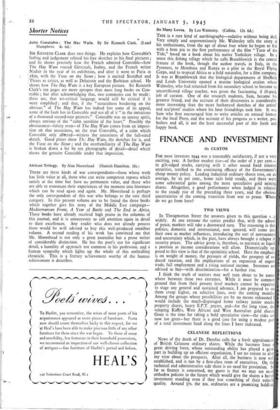FINANCE AND INVESTMENT
By CUSTOS
FOR most investors 1944 was a reasonably satisfactory, if not a very exciting, year. A further modest rise—of the order of 2 per cent.— in gilt-edged stocks, carrying with it other sound fixed interest securities, testified to the continuing efficacy of the Government's cheap money policy. Leading indttstrial ordinary shares rose, on an average, by to per cent., home rails held steady, and there were some substantial gains among the more speculative gold mining shares. Altogether, a good performance when judged in relation to the steady rise of the preceding three years, and the obvious uncertainties of the coming transition from war to peace. Where do we go from here?
TWO VIEWS In Throgmorton Street the answers given to this question widely. At one extreme the cynics predict that, with the advent of peace, markets will take a downward turn. The reasoning is that politics, domestic and international, now ignored, will come into their own as market influences, introducing the sort of nervousness and uncertainty which, in the past, have always brought a relapse in security prices. The advice given is, therefore, to maintain as liquid a position as income considerations will allow. Diametrically op- posed to this view is that of the optimiitic school. Here the emphasis is on weight of money, the pressure of yields, the prospect of re- duced taxation, and the implications of an expansion of export trade, full employment and a rising national income. Investors are advised to buy—with discrimination—for a further rise.
I think the truth of matters may well turn about to be some- where between these two extremes. While it must be common ground that from their present level markets cannot be expected to stage any general and sustained advance, I _am prepared to see them creep higher, on selective Jines, over the coming months. Among the groups whose possibilities are by no means exhausted I would include the much-disparaged home railway junior stocks, property shares, heavy E.P.T. payers, and—for the long view, de- veloping Kaffirs, West African and West Australian gold shares. Gone is the time for taking a bold speculative view—the risks are now too great—but there is a good case for using a modest part of a total investment fund along the lines I have indicated.
CELANESE REFLECTIONS News of the death of Dr. Dreyfus calls for a fresh appraisement of British Celanese ordinary shares. While the business loses great driving force, whose outstanding ability has played a great part in building up an efficient organisation, I see no reason to alter my view about the prospects. After all, the business is now well established, and is run by a first-class team of executives. On, the technical and administrative side there is no need for pessimism. S far as finance is concerned, my guess is that we may see more orthodox policies in the future which would give the shares a better investment standing even if they lost something of their volatil quality. Around 37s. the zos. ordinaries are a promising holding.


























 Previous page
Previous page